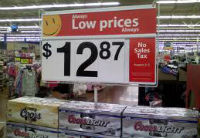In the Doghouse
Search
You are here: Home  Watchdogging
Watchdogging  In the Doghouse
In the Doghouse  In the Doghouse: Walmart's Plan: Dominate Beer Sales, Steamroll Public Health
In the Doghouse: Walmart's Plan: Dominate Beer Sales, Steamroll Public Health
 Watchdogging
Watchdogging  In the Doghouse
In the Doghouse  In the Doghouse: Walmart's Plan: Dominate Beer Sales, Steamroll Public Health
In the Doghouse: Walmart's Plan: Dominate Beer Sales, Steamroll Public HealthIn the Doghouse: Walmart's Plan: Dominate Beer Sales, Steamroll Public Health
October 29, 2013
 |
Walmart is already the nation's biggest beer retailer, but corporate greed knows no bounds. The company recently announced its strategy to double beer sales by selling it as a loss-leader and accosting shoppers with in-your-face, floor-to-ceiling stacks of cases. Walmart joins mega-retailers such as Costco and Amazon, bent on using cheap alcohol to lure customers and keep the profits flowing. Drowning the masses in super-cheap alcohol comes at a huge economic, health and social cost, and the mega-retailers or alcohol producers are not paying even close to their fair share of the tab for alcohol-related injuries, diseases, and deaths.
Cheap alcohol prices encourage excessive drinking and youth consumption, and undermine pricing recommendations to prevent those very same public health problems. High alcohol prices reduce violent crime, traffic crashes, disease, and mortality. Youth are particularly sensitive to beer pricing, and Walmart's planned mountains of cheap Bud Light, the underage youth brand of choice, fly in the face of the U.S. Surgeon General's recommendation to eliminate low-price, high-volume alcohol availability to prevent underage drinking.
The economic havoc of excessive alcohol consumption is staggering. Alcohol-related harm from excessive consumption directly costs U.S. federal, state and local governments $94 billion annually, running about $0.80 per drink. Alcohol excise taxes cover about $0.15 of this cost, while taxpayers bear the remaining $0.65. Walmart, other retailers, and the rest of the industry rake in the profits, while taxpayers subsidize the costs.
Walmart's pricing strategy is an unacceptable assault on public health and safety. Raising the price of alcohol by increasing taxes is the most effective policy to mitigate the public cost of cheap alcohol. Unless policymakers increase the price of alcohol, taxpayers and their families will pay the tab while Walmart and alcohol producers reap ever-increasing profits, and the alcohol-related harm continues.
Help us hold Big Alcohol accountable for the harm its products cause.
| GET ACTION ALERTS AND eNEWS |
STAY CONNECTED    |
CONTACT US 24 Belvedere St. San Rafael, CA 94901 415-456-5692 |
SUPPORT US Terms of Service & Privacy Policy |
Copyright © 2026 Alcohol Justice. All Rights Reserved.
Joomla! is Free Software released under the GNU General Public License.

